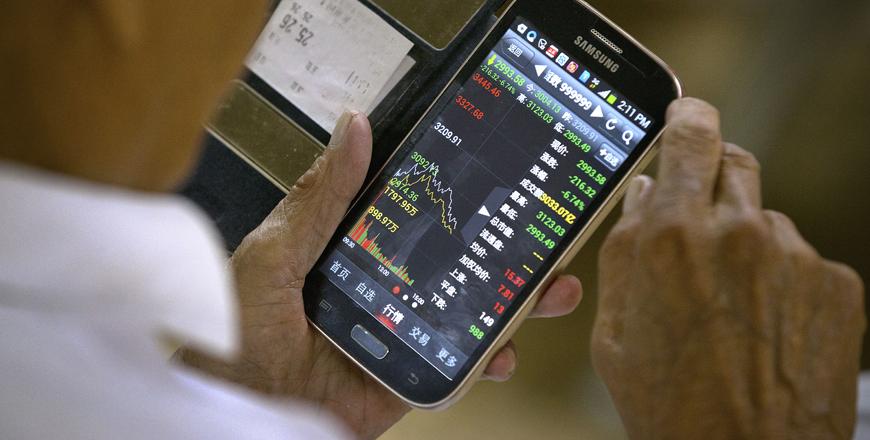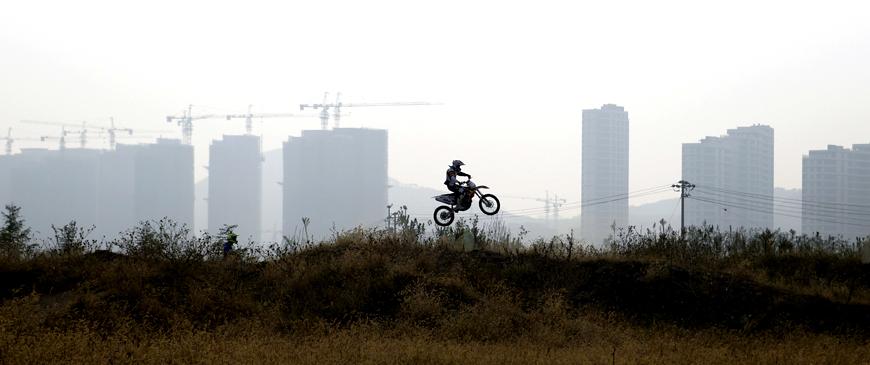You are here
China cuts interest rates, reserve ratio after stocks plummet again
By Reuters - Aug 25,2015 - Last updated at Aug 25,2015

A Chinese investor uses his smartphone to monitor stock prices at a brokerage house in Beijing, on Tuesday (AP photo)
SHANGHAI/BEIJING — China's central bank cut interest rates and lowered the amount of reserves banks must hold for the second time in two months on Tuesday, ratcheting up support for a stuttering economy and a plunging stock market that has sent shockwaves around the globe.
The moves came after Chinese stocks tumbled again on Tuesday, as investors despaired at the lack of policy action from Beijing in response to recent data suggesting the downturn in the world's second-largest economy was deepening.
The People's Bank of China (PBoC) said it was cutting the one-year benchmark bank lending rate by 25 basis points to 4.6 per cent, cutting one-year benchmark deposit rates by the same amount, and reducing reserve requirements (RRR) by 50 basis points to 18 per cent for most big banks.
Major Chinese stock indexes nosedived more than 7 per cent on Tuesday, hitting their lowest levels since December, following a more than 8 per cent plunge on Monday.
The slump had resumed last week despite Beijing's efforts to arrest a 30 per cent crash earlier in the summer with hundreds of billions of dollars of state-backed share purchases.
This time, the government appeared to be sitting on its hands until Tuesday's response, which aimed more at shoring up economic fundamentals than underpinning stocks.
"Although this has some elements of giving comfort to the market, this is more about giving a real boost to the real economy so the government can continue to have its 7 per cent growth rate fulfilled," said Liu Li-Gang, China economist at ANZ Bank in Hong Kong.
Liu said the RRR cut was the most significant element of the PBoC action, as it would inject 650 billion yuan ($101 billion), into the economy and ease concerns of a "hard landing".
China, one of the main engines of the world economy, has overtaken Greece at the top of the worry list of global investors, who fret its economy is growing at a much slower pace than the official 7 per cent target for 2015.
"Currently, there is still downward pressure on China's economic growth," the central bank indicated in a separate statement. "There is also relatively big volatility in global financial markets, which require more flexible usage of monetary policy tools."
German Finance Minister Wolfgang Schaeuble said the situation in China would be discussed by the Group of 20 (G-20) nations.
Futures limit-down
The CSI300 index of the largest listed companies in Shanghai and Shenzhen dropped 7.1 per cent on Tuesday, while the Shanghai Composite Index fell 7.6 per cent to close below the psychologically significant 3,000-point level.
Underscoring the panic gripping the retail investors who dominate China's stock markets, all index futures contracts fell by the maximum 10 per cent daily limit, pointing to expectations of even deeper losses.
Though the PBoC move came after domestic markets had closed, stock markets in Europe jumped, and US stock futures were also given a lift.
After the turmoil in China rocked world equity and commodity markets on Monday, policymakers elsewhere in Asia sought to soothe fears about the broader impact on the global economy.
"I think it's important that people don't hyperventilate about these types of things," said Australian Prime Minister Tony Abbott, whose country is heavily exposed to China, the biggest consumer of its commodity exports.
"It is not unusual to see stock market corrections. It is not unusual to see bubbles burst in particular markets and for there to be some flow-on effect in other stock markets, but the fundamentals are sound," he added.
This week's steep declines have taken Chinese stocks into negative territory for the year to date, although Leland Miller, president of China Beige Book International, pointed out that Chinese equity markets have shown little correlation with the real economy, either on the way up or the way down.
"Previous boom-bust cycles in Chinese stocks have also shown little or no connection to [apparent] economic performance," said Miller, whose firm provides anecdotal survey information about China based on the US Federal Reserve's "Beige Book" model.
European Central Bank (ECB) Vice President Vitor Constancio said it was too early for the ECB to respond to China's market fall.
"Indications are that what we get out of China is that the economy is not decelerating so much to justify the rout in the stock market," he told journalists on the sidelines of a conference.
No rescue?
While there is little evidence that the stock market mayhem has dampened consumer spending so far, concerns about the economy intensified after factory activity shrank at its fastest pace in almost six-and-a-half years and the central bank unexpectedly devalued its yuan currency earlier this month.
A majority of analysts, however, predicts a continued deceleration, rather than a crash, for China's economy, and dismisses comparisons with the 2008 Global Financial Crisis or the 1997/98 crisis in Asia.
"The current panic is essentially 'made in China'. The recent data from other major economies have generally been good and there is little to justify fears of a major global downturn," wrote economists at Capital Economics.
"China's recent economic data suggest that growth remains sluggish, but are not weak enough to justify fears of a hard landing," they said.
Some companies, too, have sought to reassure investors that China's economy is not about to go over the cliff, with Apple Inc. CEO Tim Cook and planemaker Boeing Co. making encouraging noises about China on Tuesday.
Related Articles
BEIJING — China's central bank cut interest rates on Friday for the sixth time in less than a year, and it again lowered the amount of cash
NEW YORK — Asian and European stocks rebounded on Friday on China's interest rate cut, but US equities gyrated amid fears that sky-high infl
SHANGHAI/BEIJING — China's foreign exchange reserves posted their biggest monthly fall on record in August, reflecting Beijing's attempts to















